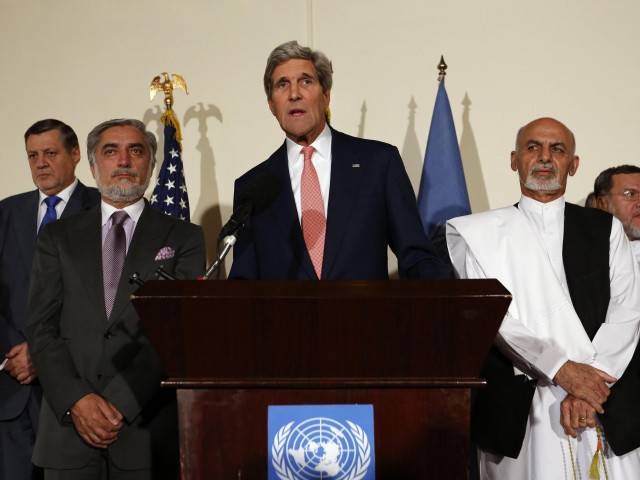Afghanistan: A Victory for Diplomacy – for now, at least

Afghanistan’s two rival candidates reached a breakthrough agreement Saturday to a complete audit of their contested presidential election and, whoever the victor, a national unity government.
The deal, brokered by U.S. Secretary of State John Kerry, offers a path out of what threatened to be a debilitating political crisis for Afghanistan, with both candidates claiming victory and talking of setting up competing governments.
Such a scenario could have dangerously split the fragile country’s government and security forces at a time the U.S. is pulling out most of its troops and the Taliban continues to wage a fierce insurgency.
After two days of intense talks between Kerry, former foreign minister, Abdullah Abdullah and former Finance Minister Ashraf Ghani, all parties agreed that the best way out of the acrimonious and protracted deadlock was to delay the inauguration and recount all the ballots from scratch.
Preliminary results from the run-off vote on June 14 put Ghani, a former World Bank official, well ahead but Abdullah rejected the result, claiming widespread fraud and calling the outcome a “coup” against the Afghan people.
In a joint news conference with Kerry held just before midnight, Saturday the two rivals agreed to abide by the outcome of a U.N.-supervised recount.
“Both candidates have committed to participate in and abide by the results of the largest and most comprehensive audit,” Kerry said. “Every single ballot that was cast will be audited.”
This is the strongest possible signal by both candidates of the desire to restore legitimacy to the process.”
The recount was scheduled to begin within 24 hours, but was likely to take several weeks, meaning that a presidential inauguration scheduled for Aug. 2 will have to be postponed.
The dispute has raised concerns about a smooth transition of power in Afghanistan just as U.S.-led troops are leaving after 12 years of fighting the Taliban.
The stakes are high for the United States. Washington hopes to settle the dispute quickly so it can sign a security pact with Afghanistan allowing a contingent of U.S. troops to stay in the country beyond this year.
Unlike incumbent Hamid Karzai, both Abdullah and Ghani have both promised to sign the deal promptly, but the standoff over the vote has delayed the process.
After his own talks with Kerry, Karzai said he welcomed the initiative and hoped the full audit would start quickly:
“The people of Afghanistan have been patient and they are in a hurry and would like to hear as soon as possible the result of the election and witness their next president.”
Abdullah, who is of both Tajik and Pashtun ancestry has support mainly in the north, among the Tajik minority, while Ghani is supported by Pashtun tribes in the east and south, though
Abdullah claims his support reaches across the ethnic divide, the election results being fraudulent.
Observers have warned that if the dispute is not resolved quickly, Afghanistan could split along ethnic lines, with further violence likely, especially as neighbors such as Pakistan, who have a vested interest having elements of the Taliban wield influence in the new administration, are poised to take advantage of the instability.
For more, click on the following link: Afghanistan Election: What Happens Next?
 The Global Calcuttan Magazine
The Global Calcuttan Magazine